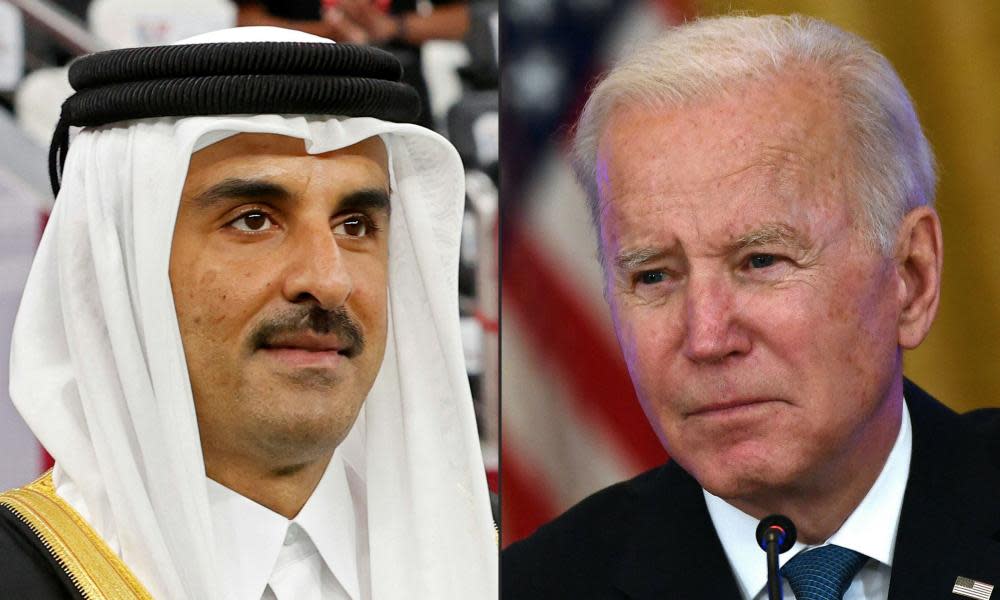Qatar in talks to supply gas to Europe if Russia cuts supplies

The emir of Qatar, Sheikh Tamim bin Hamad al-Thani is expected to tell the US president, Joe Biden, that his country will provide some short-term emergency liquid gas to help replace any loss of supplies if Russia cuts off supplies to Germany.
Qatar is looking to supply Europe through transferring excess supplies in storage in east Asia. It is also hoping to return to the European market on a bigger scale as its own production levels rise, but wants to see an end to an European Commission anti-trust investigation.
One source familiar with the talks said: “It looks as if they will have something to announce next week. There have been talks going on for a fortnight or more. It would be painful for Qatar but doable.”
British sources, which are involved in separate talks with Qatar, believe Doha can help bail Europe out even though Germany, which is dependent on Russian natural gas, has no liquified gas import terminal. The bulk of Qatar’s gas is sold in Asian markets on long-term contracts, but sources said there was some flexibility, albeit nowhere not enough to replace a full Russian cut-off.
The emir is due to meet Biden on Monday in Washington and the discussion will focus on how Qatar can help Europe from being plunged into darkness and cold if a conflict over Ukraine breaks out. Relations between the two countries are at an all-time high due to Qatar’s help with the US Afghan airlift, and a further promise of help from Doha on gas might tip the scales as Vladimir Putin decides if an invasion would be valuable.
The US secretary of state, Antony Blinken, has lavished praise on Qatar in recent months, and the only political tension has come over the pressure Qatar has put on the US to do more to release humanitarian funds to help Afghanistan famine.
Qatar is the largest global supplier of liquefied natural gas (LNG) alongside Australia. Two-thirds of its sales in the Asian market are under long-term deals, sometimes 20 years. Australia, a close ally of the US, has already promised to help.
Germany is dependent on Russian gas for its energy needs, drawing more than half of its gas imports from Russia against around 40% on average for the European Union, according to the EU’s statistics agency, Eurostat.
Nikos Tsafos, energy specialist at the Centre for Strategic and International Studies, said Europe was due anyway to import record amounts of LNG in January, but the proportion being sent to Europe from Qatar remained at a floor of 1m tonnes a month. By contrast Asia is purchasing 5m tonnes from Qatar.
In 2010 Qatar was broadly exporting equal amounts of gas to Europe and Asia. Some of this switch is down to Qatar’s hostility to a European Commission anti-trust investigation launched in 2018 looking at the way Qatar was selling long-term contracts into the European market. Qatar is looking for signs this investigation will wind down.
Putin has always insisted that he will never use gas as a geopolitical weapon, and there is no guarantee Russia would try to plunge Germany into the dark if heavy western sanctions are imposed.
A report from the Centre for American progress – a thinktank close to the Biden administration, warned this week: “In a fight over Ukraine, Russia would without a doubt be prepared to cut off gas supplies to Europe in winter. Furthermore, fighting in Ukraine could affect the flow of gas to Europe if pipelines are damaged or supplies are cut. Europe should therefore be taking immediate steps to prepare for a gas shortage this winter.”
Germany receives its LNG via three terminals in Belgium, Holland or Poland. Another possible terminal is Rodvigo in Italy.
Plans to build a German LNG terminal at Brunsbüttel have not yet borne fruit, despite pressure from the previous US administration.
German energy executives remain optimistic that the close inter-dependence of Russia and Germany will prevent a breakdown in oil supplies, or a wider confrontation.
Markus Krebber, chief executive of RWE, Germany’s largest electricity supplier, told the German press a full Russian blockade would leave Germany only able to cope for a very few weeks.
If Putin did cut off supplies, it would be losing foreign exchange reserves, and spell the demise of the controversial Nord Stream 2 pipeline since its defenders would no longer be able to argue that Russia had ring-fenced the project from geopolitical considerations.
Krebber also advanced long-term plans to make German gas supplies more secure so “that gas suppliers have to secure their delivery obligations to a certain extent through long-term purchase contracts or storage”.

 Yahoo News
Yahoo News 
